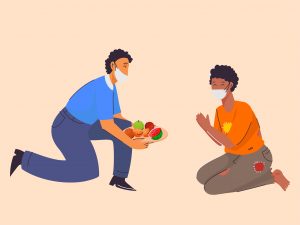
Deanna Senko is an undergraduate student at the University of Ottawa. She is pursuing a Bachelor’s degree in International Development and Globalization with a minor in Gender Studies. Deanna worked as an intern with the communications team at the Forum of Federations. She has also worked on provincial political campaigns and participated in advocacy groups dedicated to global equity.
PDF Download Coming Soon!
In early 2021, the global community passed the one-year mark since the beginning of the pandemic caused by the rapid spread of the COVID-19 virus.
As of May 9, 2021 there have been 157,289,118 confirmed cases of COVID-19 worldwide and 3,277,272 COVID-related deaths (WHO, 2021). This pandemic has forced many national and subnational governments to impose physical distancing, travel restrictions and lockdown measures as a means to slow the spread of the virus. These measures have kept apart friends and family for extended periods as the need to break transmission chains has become increasingly acute. In a recent Kaiser Family Foundation (KFF) report on the impacts of COVID-19 on adults in the United States, this isolation has been proven to negatively impact mental health (varying according to a number of intersectional factors). Furthermore, certain COVID-19 safety guidelines, such as those recommending the wearing of personal protective equipment (PPE) in public, have fueled political outrage and polarization, as reflected in the contrasting positions taken by some Democratic and Republican voters in the United States in relation to mask wearing (Pew Research Center, 2020). Inter-personal interactions in society have also been influenced by the pandemic. The US-based National Public Radio (NPR) has noted a rise in extremist, racially motivated hate. Fear of COVID-19, the destabilization of the pandemic, and youth spending more time on social media have provided the socio-political context for extremist groups to exploit individuals and spread racist messages. White supremacists have blamed Asian American and Pacific Islanders (AAPI) for the virus (NPR, 2020). The Stop AAPI Hate National Report reveals 3,795 reports of incidents against AAPI over the past year of the pandemic (Stop AAPI Hate, 2021).
As the health, economic and ultimately human costs of COVID-19 are so apparent, it is tempting to view our current times as an unremittingly dark period in world history. However, amidst the negative, some countries have utilized the shock of COVID-19 to examine their governance systems, including where decision-making power lies, in order to improve upon their efficiency and better serve their populations.
One of these countries is India. In a recent webinar hosted by the Watson Institute of International & Public Affairs and the Center for Contemporary South Asia (both at Brown University, Rhode Island), Junaid Ahmad, Country Director for the World Bank India, identified positive changes – initiated by what he calls the “shock of COVID-19” – in two major governance areas that have influenced how India views its current federal system.
Some of the changes highlighted by Mr. Ahmad in the webinar have occurred in the informal economic sector. First, the Indian government has started to address gaps in the social protection system between genders as well as between urban and rural regions. These actions include improving the public distribution system regarding food delivery (i.e. the Targeted Public Distribution System or TPDS). Another COVID-19 support measure, targeted at women in vulnerable economic situations, was the provision of cash transfers to the Jan Dhan bank accounts of 200 million women for a period of three months, as noted in the Gender and Inclusion in Social Protection Responses During Covid-19 report (SPACE, 2020). The Indian government is also looking at creating a portable social protection system in the future.
According to Mr. Ahmad, COVID-19 opened the eyes of the Indian government to the important role of the state in stabilizing the national economy. India follows a federal system of governance that incorporates unitary features (National Portal of India, 2020). The Indian federation is largely ‘top-down’, meaning decisions are born out of planning at the central level of governance and trickle down to the state and local levels. Or, as expressed by Clouser, McCann, Shipan, and Volden in Publius: “top-down vertical policy diffusion results when the actions of a higher governmental level influence those of lower levels”. The COVID-19 crisis highlighted a number of issues. First, emergency federalism and “trending of state” (Ahmad, 2021): in other words, the necessity to turn toward state and local levels of government for assistance during a crisis. Second, the lack of an urban governance model – that is to say, a proven template for planning, financing, and managing urban areas (GSDRC, 2016). Third, state capability challenges, such as the lack of funding and personnel (Carnegie Endowment for International Peace, 2019). Some of these issues are discussed in a recent Forum paper on Federalism and COVID-19 in India by Rehka Saxena. She notes cooperative federalism between the union health ministry and different state administrations regarding lockdown measures, often initiated by the states. In response to these issues, India’s government invested in state capability through the cooperation with the union health ministry and, as noted by Ms. Saxena, through financial support packages to the population which included “free food grains and cooking gas for the poor for three months” (Saxena, 2020). India’s federal government is also working on modernizing the country’s social protection system in an effort to increase equity within the population. In 2020, the World Bank announced approval of India’s new $400 million Project to Protect India’s Poor and Vulnerable from the Impact of COVID-19.

Other changes brought upon by the shock of COVID-19 highlighted by Mr. Ahmad are associated with climate change. India has initiated numerous grand plans to address global warming. These plans include an energy transition from coal to renewable solar power, as well as transportation transitions toward an efficient city bus system and moving freight from roads to rail. India’s shift towards renewable energy sources has been boosted by the drop in demand for coal due to the pandemic, as noted by the Aspen Institute (2020). The economic lull brought on by COVID-19 in India has allowed governments to focus on sustainable projects, such as building new and innovative freight corridors to reduce their carbon footprint. Based on their current policy projections, India is set to meet or surpass their Nationally Determined Contributions (NDC) of the 2015 Paris Agreement under the United Nations Framework Convention on Climate Change (UNFCCC) (Climate Action Tracker, 2020).
India has undoubtedly been hit hard by a second wave of COVID-19 which has bombarded the health care system since March 2021 (ABC News, 2021) and brought new challenges to the country’s governance system. The Supreme Court of India recently intervened to ensure the supply of oxygen and other medical resources to hospitals for COVID-19 patients (DW, 2021), a decision which has faced criticism by members of the Indian National Congress for being an “over-centralized” response to COVID-19 (The Economic Times, 2021). The human tragedy experienced by the country in 2021 cannot be understated, and may lead to further examination of whether additional reform is required in the governance arena.
The positive changes driven by COVID-19 are not limited to India. Andrea Gustafson of the Social Science Research Council suggests the pandemic may have strengthened federalism in the United States and, by extension, democracy. She points out that, as individual states take initiative in the COVID-19 response, state governments are able to create policies that most appropriately address the needs of their respective constituencies. She also notes that state and local levels of governance provide increased access for constituents to participate in politics (Gustafson, 2021).
In a policy brief published in late 2020, the Organisation for Economic Co-operation and Development (OECD) reported several changes in the governance practices of different countries since the beginning of the COVID-19 crisis. For example, Ireland moved to “telehealth/online medical consultations” to make their delivery of services more accessible, and Austria supported employees in the public sector with tools to allow them to work remotely more easily (OECD, 2020). In Sweden, the government provided medical training to airline and hotel workers who were furloughed due to COVID-19 so they could assist in health care sectors (Ibid., 2020). On a more political level, Brazil “implemented the Remote Deliberation System (SDR), a platform that allows Brazilian MPs to debate and vote on draft bills during a state of emergency” to allow the business of the Federal Senate to continue during the pandemic. Significantly, the SDR has also been implemented at the state and local levels (Ibid., 2020). It remains to be seen whether these changes will endure in a post-pandemic context. However, many of the alterations made to policy and governance could be used as a template for future governance models.
A brief examination of some of the policy changes made in different countries as a means to cope with and regulate the effects of the pandemic may reveal a small silver lining to the COVID-19 cloud. Perhaps the pandemic has initiated some positive change in the way countries govern that could lead to more inclusive and responsive governance that better serves the needs of the people.
Liam Whittington contributed to this article.
Bibliography
Ahmad, J.K. (2021). Indian Federalism and Service Delivery: Navigating the Challenges of Covid-19. Watson Institute International & Public Affairs at Brown University. Retrieved live from webinar from https://watson.brown.edu/events/2021/junaid-kamal-ahmad-indian-federalism-and-service-delivery-navigating-challenge-covid-19
Allam, H., King, N., Martinez, S.F. (2020). Extremists Use COVID-19 Fears to Spread Hate, Authorities Say. NPR: National Security. Retrieved from https://www.npr.org/2020/04/22/840717843/extremists-use-covid-19-fears-to-spread-hate-authorities-say
Clouser McCann, P.J., Shipan, C.R., Volden, C. (2015). Top-Down Federalism: State Policy Responses to National Government Discussions. Publius: The Journal of Federalism. Retrieved from http://www-personal.umich.edu/~cshipan/McCannShipanVolden%20Publius2015.pdf
Economic Times Bureau. (2021). SC Intervention to ‘Overcentralize’ Actions Against COVID Pandemic Wrong: Congress. Retrieved from https://economictimes.indiatimes.com/news/politics-and-nation/supreme-court-intervention-in-covid-19-management-uncalled-for-congress/articleshow/82214091.cms?from=mdr
Government of India. (2021). Governance and Administration. National Portal of India. Retrieved from https://www.india.gov.in/topics/governance-administration
Holmes, R., Peterman, A., Sammon, E., Cabot Venton, C., Alfers, L. (2020). Gender and Inclusion in Social Protection Responses During COVID-19. SPACE Social Protection Approaches to COOVID-19: Expert Advice Helpline. Retrieved from https://reliefweb.int/sites/reliefweb.int/files/resources/SPACE%20Gender%20and%20Inclusion_20052020v1.pdf
Krishnan, M. (2021). COVID: Indian Courts Demand Government Accountability. DW Made for Minds: Asia. Retrieved from https://www.dw.com/en/covid-indian-courts-demand-government-accountability/a-57463723
Mahendra Dev, S. (2020). Addressing COVID-19 Impacts on Agriculture, Food Security, and Livelihoods in India. IFPRI. Retrieved from https://www.ifpri.org/blog/addressing-covid-19-impacts-agriculture-food-security-and-livelihoods-india
OECD. (2020). The Covid-19 Crisis: A Catalyst for Government Transformation? OECD Policy Responses to Coronavirus (COVID-19). Retrieved from https://www.oecd.org/coronavirus/policy-responses/the-covid-19-crisis-a-catalyst-for-government-transformation-1d0c0788/
Panchal, N., Kamal, R., Cox, C., Garfield, R. (2021). The Implications of COVID-19 for Mental Health and Substance Use. Kaiser Family Foundation. Retrieved from https://www.kff.org/coronavirus-covid-19/issue-brief/the-implications-of-covid-19-for-mental-health-and-substance-use/
Pandey, S. (2020). How India got PDS Delivery Right During the Pandemic. Financial Express. Retrieved from https://www.financialexpress.com/opinion/how-india-got-pds-delivery-right-during-the-pandemic/2148293/
Saxena, R. (2020). Federalism and the COVID-19 Crisis: Center-State Apposite Relations in Pandemic Federalism – India. Forum of Federations. Retrieved from http://www.forumfed.org/wp-content/uploads/2020/04/IndiaCOVID3.pdf
Schumaker, E. (2021). A ‘complete collapse’ of preventive health: How India’s 2nd COVID wave exploded. ABC News. Retrieved from https://abcnews.go.com/Health/complete-collapse-preventive-health-indias-2nd-covid-wave/story?id=77316993
Sharma, P. (2021). Federalism in US and India: A Comparative Study. SSRN. Retrieved from https://papers.ssrn.com/sol3/papers.cfm?abstract_id=3790237
Sivaram, V. (2020). The Next Phase of India’s Renewable Energy Transition. Aspen Institute. Retrieved from https://www.aspeninstitute.org/blog-posts/the-next-phase-of-indias-renewable-energy-transition/
UNFCCC. (n.d) Nationally Determined Contributors (NDCs). Retrieved from https://unfccc.int/process-and-meetings/the-paris-agreement/nationally-determined-contributions-ndcs/nationally-determined-contributions-ndcs
Vaishnav, M. (2019). Transforming State Capacity in India. Carnegie Endowment for International Peace. Retrieved from https://carnegieendowment.org/2019/07/02/transforming-state-capacity-in-india-pub-79411
Van Kessel, P., Quinn, D. (2020). Both Republicans and Democrats Cite Masks as a Negative Effect of COVID-19, but for very Different Reasons. Pew Research Center. Retrieved from https://www.pewresearch.org/fact-tank/2020/10/29/both-republicans-and-democrats-cite-masks-as-a-negative-effect-of-covid-19-but-for-very-different-reasons/
WHO. (2021). WHO Coronavirus (COVID-19) Dashboard. Retrieved April 14th from https://covid19.who.int/
World Bank. (2020). World Bank Approves $400 Million Project to Protect India’s Poor and Vulnerable from the Impact of COVID-19. Retrieved from https://www.worldbank.org/en/news/press-release/2020/12/15/world-bank-approves-usd400-million-project-to-protect-india-s-poor-and-vulnerable-from-the-impact-of-covid-19
World Bank. (2021). India Takes a Quantum Leap in Building New Freight Corridors. Retrieved from https://www.worldbank.org/en/news/feature/2021/01/12/india-takes-a-quantum-leap-in-building-new-freight-corridors





